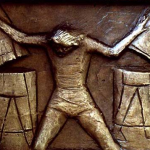by Fr. Patrick Henry Reardon
 For why Samson is included among the Bible’s heroes, see the article The Bible’s Ultimate Party Boy.
For why Samson is included among the Bible’s heroes, see the article The Bible’s Ultimate Party Boy.
Among Old Testament “types,” Samson arguably provided the most memorable example of a man who gave his life for the people. When he brought down the roof of the pagan temple on both himself and Israel’s Philistine oppressors,
“the dead he killed at his death were more than those he had killed in his life” (Judges 16:30).
In Samson we have a true typos of the self-sacrifice of Christ. Already in the second century Irenaeus of Lyons saw in Samson’s selfless deed the very “mystery of Christ.” In the third century, likewise, the anonymous Song Against Marcion proclaimed that Samson stood “alone for the people” (pro populo solus), as a “conqueror by his death” (victor sua morte).
The Maccabean period provided an almost perfect parallel to Samson in the person of Eleazar the Maccabee. In close and desperate battle against Israel’s adversaries this warrior carefully studied the war elephants that buttressed the enemy line. Finally, he
“saw one of the beasts harnessed with the king’s harness: and it was higher than the other beasts: and it seemed to him that the king was on it. So he gave himself in order to save his people [edoken heavton tou sosai ton laon avtou] and to gain for himself an everlasting name. . . . And he went between the feet of the elephant, and put himself under it, and slew it, and it fell to the ground upon him, and he died there” (1 Maccabees 6:43-46).
A more subtle example of self-sacrifice is provided by the Patriarch Judah. Inasmuch as Judah does not die in the story, this example may easily be missed. We recall the scene from Genesis 44, which sets the context for Joseph’s self-revelation to his brothers. At this point in the narrative, Judah has become the spokesman for those brothers. When wily Joseph—his identity not yet disclosed—threatens to imprison Benjamin, Judah, lovingly motivated by a concern for their aging father, offers himself in place of his younger brother. It is this offer that proves to Joseph that his siblings are truly changed men. Judah is prepared to offer himself as the “substitute” for Benjamin and, by extension, for all his brothers. This is the decisive point in the story.
The parallel to the self-offering of Jesus is striking. Judah, like his incarnate Descendant – Mary’s son – offers himself for the sake his father and his brothers. He takes upon himself his brothers’ offense, becoming the sacrificial victim to redeem the family. And he does these things, like his distant Descendant many centuries later, out of love for his father. Of Judah, too, it is proper to speak of a typos of Christ. Such is the New Judah’s ultimate and compelling plea before the Throne:
“The world must know that I love the Father” (John 14:31).
Of the Old Testament examples I have listed, this is the only one that involves a “substitutionary” offering. The idea of a substitution is integral to the biblical concept of sacrifice. If we were to use the preposition hyper in the case of Judah, it would not only mean “for the sake of,” but also “in place of.” This is also true of the self-sacrifice of Jesus. Like the Paschal Lamb, he “replaces” his Chosen People in the midnight sacrifice of their Redemption from Egyptian bondage.
I believe it is important at this point, however, to remark on what we do not find in these instances: In God’s biblical dealings with men, no one ever bears someone else’s punishment. It is an evil thing to punish an innocent person in place of a guilty person; God does not do it. Consequently, when we speak of Christ’s offering himself for our sake, we must not suppose that the Father punished him in place of us. Holy Scripture is explicit on the idea of “substitutionary punishment”:
“Fathers shall not be put to death for their children, nor shall children be put to death for their fathers; a man shall be put to death for his own sin.”
It is important to a proper understanding of the Atonement that we maintain clarity on this point, particularly when we consider what is meant by “substitutionary sacrifice.” In the Bible—emphatically—the victim of a blood sacrifice is never said to be punished. The death of the sacrificed substitute—bull or lamb or whatever—is not regarded as a punishment. The atonement effected by sacrifice in the Bible is not penal. It is theologically incorrect, then, to say that Jesus, for our sins, was punished in our stead. Misunderstanding on this point leads to a very distorted soteriology.